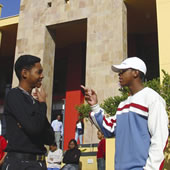This is an action packed, adrenalin pumping 2½ fun filled days where we teach you: the Eskimo Roll, Paddle Strokes, Boat Control, River Reading and basic River Safety as we paddle along the wild and scenic Vaal River. No kayaking experience necessary and all equipment is provided.
Perfect weekend fun for all healthy moderately fit male and female, families, couples, singles. And groups, from mid-teens and upwards.
- We practise the following skills:
- Paddle strokes which are briefly explained on land.
- The “wet exit” procedure is explained on land and in the pool by the instructor. You then get the chance to get wet in the pool by practising the “wet exit” and also get the chance to perfect your boat emptying skills. During the “wet exit” procedure, the correct swimming position is also explained.
- Following the “wet exit”, you “the kayakers” move on to the Eskimo-roll. This includes practicing hip-flicks and also assisted rolls and unassisted rolls. Great fun!
After this session attention will be given to understanding the river and also how to read the river and to identify possible hazards. The Saturday session runs as follows:
- Start with a safety briefing.
- Get onto flat water and paddle around to get a feel for your boat. Practise paddle strokes and correct body position which your instructor will teach you.
- Play a game of “stingers” with the kayaks! This is a really great way of learning to control your boat whilst having good fun.
- Try out “wet exits” in the river and also if you are brave enough, give the Eskimo-roll a go.
- The importance of using your body and paddle to control the boat is explained and practised in flowing water.
- The principle of “breaking-in” and “breaking-out” of the flow is explained and practised.
- After the basic flat water and fast flowing water principles have been mastered, we move onto the good-stuff: RAPIDS… whitewater…. this is after-all what it‘s all about!
During the session the rapids will be discussed and hazards in the rapid will be pointed out. The features of a river will be shown and explained. The approach to each rapid is based on safety. The following river features will be explained:
- Downstream and upstream V’s.
- Pour-overs.
- Holes and waves.
- Strainers, undercuts and siphons.
- Eddies.
- You need to bring:
- Change of dry clothes
- Towel
- Sunblock
- Costume, shorts, t-shirt or UV top to paddle in
- Shorts
- Drinks for on the river Sense of adventure and loads of humour
This is a self catering weekend, so bring along your favourite camp / braai food. The kayak school runs over the summer season from the end of September through to May. The kayak school accommodates groups of 7 kayakers per course.
Kayaking courses @ www.courses.co.za Email: info@canoekayak.co.za





